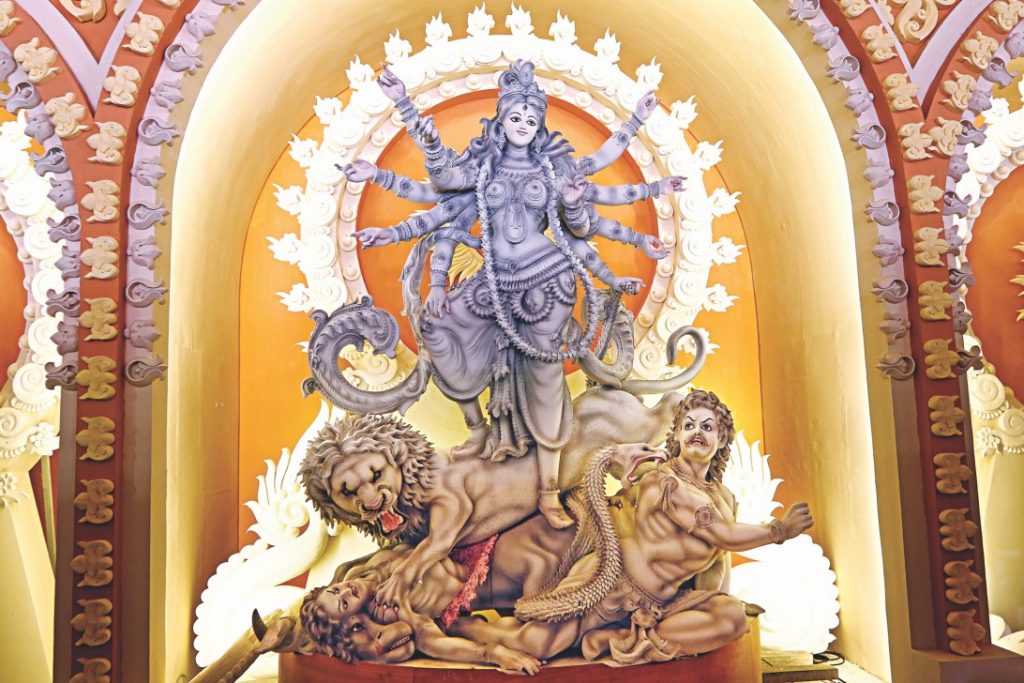From having a 5-day puja holiday to seeing streets lit up with decorations for the Puja, and honouring different POC values at various Puja sets across the subcontinent, here’s my take on the Durga Puja 2019.
A ten-day long celebration in the honour of Goddess Durga is the largest festival observed by Bengali Hindus around the globe. Each year, there are festive cheers along with notable controversies during this period, making the season very eventful. However, something else was different this year.
On Mahalaya (Day 01 of 10), I saw a series of posts on Facebook protesting about how Bangladeshi Hindus would only get the last two days as holidays, whereas the festival runs for 5 days straight (days 6–10); following these short holidays, our assignment and term paper deadlines are often set, compromising the festivities behind it. The debate on secularism and religious inequality had been quite rampant, how in each of the regions the minorities are suffering.
To everyone’s surprise, a five-day long holiday was announced in observance of the Durga Puja, throwing the arguments off the table for the time-being. Over-compensation or not, this was a step towards positivity, and it did wonders! Each temple had grand celebrations, and every pandal had a separate gateway decorated with helium light sculptures to depict the story behind the celebration.
Right or Privilege?
The above event and debate brought another question to my mind: are they a minority by quantity or because we treat them like a liability, aliens, an unwelcome presence? Speaking in the context of Bangladesh, I have asked this to my parents, relatives, and even my friends. Their answers varied around these examples: “They are better off than they were before”, “It’s a Muslim country”*, “Minority means less in number, so it’s understandable that they will be given lesser priority.”
That particular thought has probably always been a part of me: since my first visit to a temple in Delhi where I sang their prayer with them, since the first time I saw fireworks at a Diwali celebration right after having iftar at Agra, since the first time I had seen in Bollywood movies and TV serials how grandly they celebrate each of the religious festivals.
I am from a family of Muslims, we are all believers, and I find it hard to comprehend as to why, in a secular country, I would be having such debates or answering questions like, “Why are you dressing up? Are you Hindu?” Funny, how we never ask our Hindu friends why they’ve worn Punjabis or Salwar Kameez on Eid days; do we assume they are Muslims too? Or has it become so normalised we have a Muslim majority and we never question that hierarchy, so everyone must follow through?
What if the lengthy holidays were just a bait to stop the arguments? What if we are giving in too quickly to the notion, “They have gotten what they deserve!” Does that list end here? Does it ever?
Political Correctness: A wholesome surprise done right
While we are on the subject of diversity, our neighbours had gone one step forward this year, introducing an LGBTQ+ Theme in one of the Durga Puja pandals in Kolkata, conceptualised by Dum Dum Tarun Dal. Their theme reads: “Tumi Dekho Nari Purush, Ami Dekhi Shudhui Manush” which translates to “You see men and women, we only see Humans”. The Durga idol was a fusion of Krishna and Durga to shun the social marginalisation of the third gender.
Even the Asur was made to look feminine, to depict ascetic Chaitanya Mahaprabhu’’s love for lord Krishna; the various references brought across a number of galvanizing controversies surrounding the LGBTQ+ community, making this my most favourite discovery while reading about Durga Puja celebrations all around. Most pandals had extravagant themes, including ones in Bangladesh, what with Gold idols, white idols (to promote equality among humans), and another one in Kolkata which had an upside down model of the city as its ceiling.
A part of me is still not convinced that these surprises are going to become the norm and are here to stay. The rewards have been satisfactory nonetheless, despite loose ends still heaving the air.
